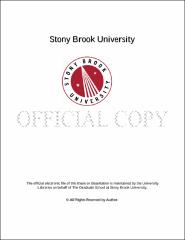| dc.identifier.uri | http://hdl.handle.net/11401/77193 | |
| dc.description.sponsorship | This work is sponsored by the Stony Brook University Graduate School in compliance with the requirements for completion of degree. | en_US |
| dc.format | Monograph | |
| dc.format.medium | Electronic Resource | en_US |
| dc.language.iso | en_US | |
| dc.publisher | The Graduate School, Stony Brook University: Stony Brook, NY. | |
| dc.type | Dissertation | |
| dcterms.abstract | Obesity affects approximately one-third of the adult population in the U.S. and is one of the primary reasons for bullying in school. While weight-related abuse (WRA) is a specific risk factor for disordered eating (binge eating, emotional eating, night eating, and unhealthy weight control) and negative self-perception, and disordered eating and negative self-perception are predictive of obesity, these relationships have not been addressed with a comprehensive model. Thus, the current study evaluated a structural equation model in which severity of WRA predicted the emotional impact of WRA and negative self-perception, which predicted disordered eating, which in turn predicted current body mass index (BMI). This model was evaluated in a sample of 371 undergraduate students, and fit indices showed an excellent fit. Model fit was also explored based on onset of overweight; while age of onset of overweight (childhood vs. adolescence) did not significantly affect model fit, the model fit was significantly better in individuals who were overweight before age 20 as compared to those who were never overweight before age 20. These analyses suggest that WRA is a specific risk factor for obesity that largely acts through its effect on emotional impact of WRA, negative self-perception, and disordered eating. Further, this model suggests that it may be of particular import to include interpersonal interventions that specifically target the results of abuse. Future research utilizing a longitudinal design and/or a clinical population (e.g., individuals seeking treatment for weight loss) will help to validate these findings. | |
| dcterms.available | 2017-09-20T16:52:10Z | |
| dcterms.contributor | O'Leary, K. Daniel | en_US |
| dcterms.contributor | Vivian, Dina | en_US |
| dcterms.contributor | Moyer, Anne | en_US |
| dcterms.contributor | Pryor, Aurora. | en_US |
| dcterms.creator | Salwen, Jessica Keefe | |
| dcterms.dateAccepted | 2017-09-20T16:52:10Z | |
| dcterms.dateSubmitted | 2017-09-20T16:52:10Z | |
| dcterms.description | Department of Clinical Psychology. | en_US |
| dcterms.extent | 58 pg. | en_US |
| dcterms.format | Monograph | |
| dcterms.format | Application/PDF | en_US |
| dcterms.identifier | http://hdl.handle.net/11401/77193 | |
| dcterms.issued | 2015-12-01 | |
| dcterms.language | en_US | |
| dcterms.provenance | Made available in DSpace on 2017-09-20T16:52:10Z (GMT). No. of bitstreams: 1
Salwen_grad.sunysb_0771E_12397.pdf: 921037 bytes, checksum: 415c704323bd1e2931ae747ea067c6c5 (MD5)
Previous issue date: 1 | en |
| dcterms.publisher | The Graduate School, Stony Brook University: Stony Brook, NY. | |
| dcterms.subject | abuse, CBT, eating disorders, self-perception, weight | |
| dcterms.subject | Clinical psychology | |
| dcterms.title | The Impact of Weight-Related Abuse on Self-Perception and Disordered Eating: A Model of Obesity | |
| dcterms.type | Dissertation | |

